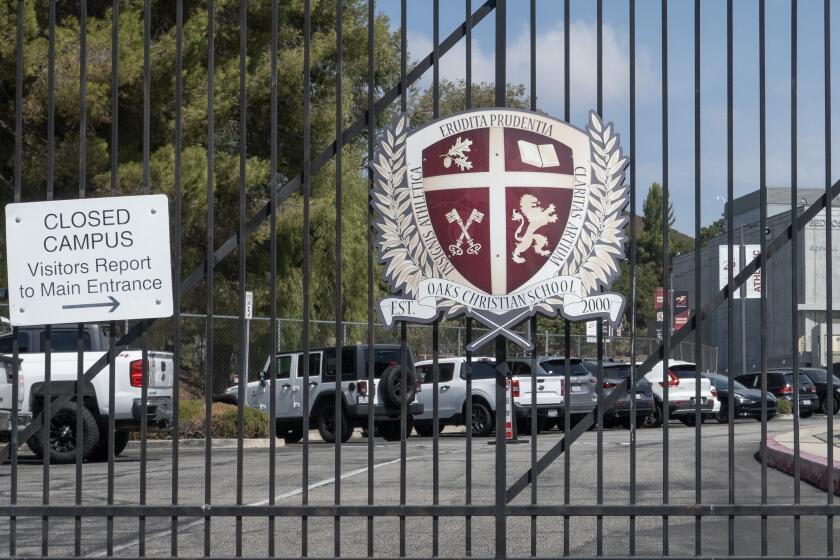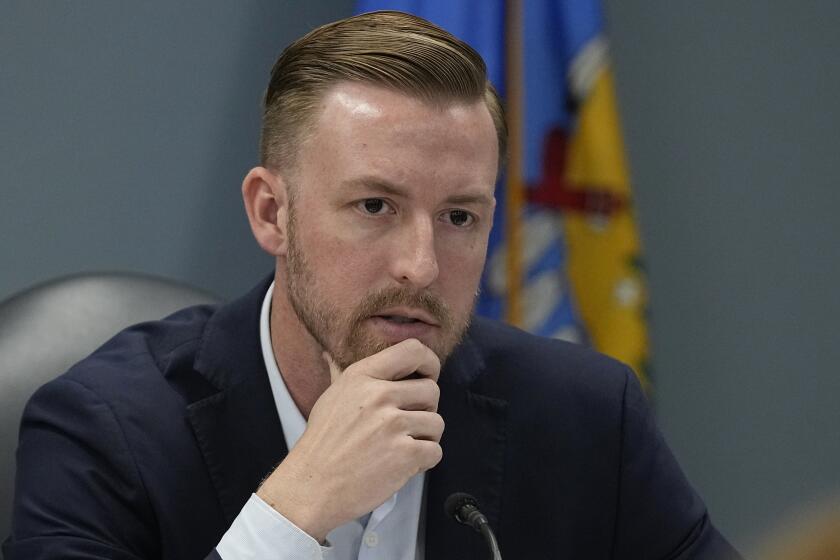Proud Memories : ’82 Decathletes Found Friendship, Self-Confidence
Twelve years ago this weekend, eight students from Palo Alto High School took their place on the winners’ stage as the victors of the 1982 U.S. Academic Decathlon.
That they competed against only 17 other states--not the 41 that Taft will face this weekend--did not cheapen their success.
Looking back, most remember glowing at being called the best students in the country and brimming with the possibilities the rest of their lives held.
Like hundreds of other teams before and since, the 1982 Palo Alto team was an eclectic bunch; decathlon rules require that each team be made up of students with A, B and C averages. All were smart, but they had varying degrees of success in high school and in the next phases of their lives.
There was Julie Inness, the A student who rode a motorcycle as a way of expressing that she was more than just a brain. She ended up a college professor and just recently published her first book.
Noga Tarnopolsky was fluent in five languages but felt so displaced by her move to the United States from Switzerland that she was close to flunking out of school. She found happier times at Amherst College and now works in Jerusalem as a speech writer for the Israeli Minister of Communications.
Team rebel Billy Northway ended one of his competition essays with a quote from the punk band the Dead Kennedys: “Ask not what you can do for your country, ask what your country’s been doing to you.” He went to Stanford University with a near-perfect score on his SATs and the last anyone knew, was working at a Northern California computer company during the week and a muffin store on the weekend. His parents are not sure where he is now.
The other five teams members each went on with life having shared an experience they credit for helping them grow as students and as people.
“Decathlon gave us an achievement to look back on. . . . It gave us a standard to keep living up to,” said former team member Jacqueline Kowtko, 29, who graduated from Harvard University and is finishing up her doctorate in linguistics at the University of Edinburgh. “I remember imagining what we would be doing in five or 10 years, and I imagined that most of us would end up at good colleges and then we’d get jobs doing something great.”
Coach Shalah Wolfsohn, who retired from teaching in 1986 but continued to coach the Palo Alto team until last year, remembered the process of choosing her team. The A-level students were easy picks; what was tougher was finding bright teen-agers who, for one reason or another, had B and C averages. Those were the students she could redeem academically.
The three C students included Tarnopolsky, who had moved to Palo Alto a year before and was alienated, miserable and increasingly depressed about her bad grades. It was her junior year, and she was beginning to think of herself as a failure.
Northway was another story. He was brilliant but rebellious. The son of a Stanford professor, he stayed up all night before his college entrance exams watching a punk rock movie and still had a near-perfect score, friends remembered. His poor grades, Tarnopolsky said, were a function of his boredom.
The third C student was Elizabeth McDevitt, a horsewoman and writer who was rebellious in a stubbornly quiet way. In the classes she liked, she would get straight As. If she thought a class was a waste of time, she did not go.
The three were fast friends. Northway and McDevitt helped Tarnopolsky out of her isolation. Tarnopolsky, who laughed as she remembered McDevitt teaching her how to cut classes, would remain their lifelong friend.
“The three of us, our main concern was how to get out of this hole we were in,” said Tarnopolsky. “In a society like Palo Alto, when you come from the kind of families that we did with parents who were professors and such, it was a rebellion to flunk out. But decathlon was a good feeling. It was something successful and fun.”
McDevitt, now 30, graduated from Wellesley College, went on to get a master’s degree in book arts from Mills College and now works as a project editor for Apple Computer, overseeing production of computer manuals.
“I remember being completely disillusioned with school,” McDevitt said from her home in Oakland. “Academic Decathlon sort of got me back into it. It got me back into studying and helped prepare me for college.”
Northway, the only student on the team not interviewed for this article, still keeps in touch with his two former teammates, though neither of the women has spoken to him since last fall, when he quit his two jobs and went on his own isolated way.
At Stanford, Northway was actively involved in campus politics and participated in sit-ins and other acts of civil disobedience as part of the Sanctuary Movement, which helped refugees from combat zones in Central America enter the United States. Tarnopolsky recalled coming home for a college vacation and being summoned, along with her mother and McDevitt, to bail Northway out of a Palo Alto jail. He was wearing one of her Amherst T-shirts at the time of his arrest, she said.
Northway enrolled in a graduate program in history at New York University, Tarnopolsky said, but did not finish. When she saw Northway last fall, she said, he told her that the two jobs would help him save some money so he could become a screenwriter.
Neither she nor McDevitt has spoken to him since. His mother said she has not spoken to her son and had no way to reach him.
“Each one of us has his or her own lot in life,” Tarnopolsky said. “And Billy’s hasn’t been simple.”
The B students, Simon Hawkins, 28, and Marcantonio Ferrari, 30--who both graduated from Swarthmore University--were both remembered by their teammates as being quiet.
Hawkins, like Tarnopolsky and Northway, was a year younger than most of the team, and would come into his own in his second year of competition.
After college, Hawkins worked as a paralegal in Washington and then attended Clown College at the winter quarters of Ringling Bros. and Barnum & Bailey Circus. He later served in the Peace Corps in Tunisia and now works as a research associate for the National Center for Improving Science Education, a think tank in the nation’s capital.
Ferrari had a different reason for being shy. Now an anesthesiologist at County-USC Medical Center, Ferrari remembers keeping to himself to guard his big secret: He was attending Palo Alto High School illegally. Every day, Ferrari would cross the border from Los Altos so he could take advantage of a Palo Alto program for advanced science students to take classes at Stanford.
Although he was reserved with his teammates, the competition nonetheless gave Ferrari a place where he could make friends, he said. Lest anyone find out his real address, he did not spend much time with his peers or go to parties. He recalled studying most of the time and using that as an excuse.
As for the A-level students, Kowtko is writing her dissertation at Edinburgh University in computer speech recognition. Her work to determine how a word’s pitch affects meaning, she said, is a step on the road to having interactive speech with computers.
Jennifer Rickard, 30, graduated from Swarthmore and earned her master’s in business administration at New York University. She now is an associate dean of admissions at Swarthmore.
Inness, an assistant professor of philosophy at Mount Holyoke University, got her doctorate from Stanford in 1989, at age 25. Her first book, “Privacy, Intimacy and Isolation,” was published in 1992.
She no longer rides a motorcycle. “How we change when we become professors,” Inness said.
“I still have clippings stuck around somewhere. And when I look back at the pictures in the paper, I’m proud I was part of that back then.”
More to Read
Sign up for Essential California
The most important California stories and recommendations in your inbox every morning.
You may occasionally receive promotional content from the Los Angeles Times.










